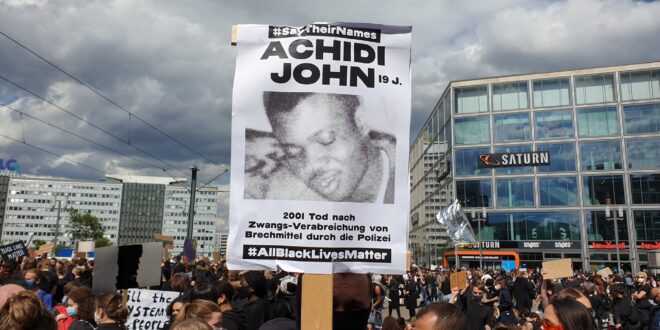The acquittal of five police officers involved in the fatal shooting of 16-year-old Mouhamed Dramé in Dortmund has sparked widespread disappointment and outrage, particularly within the African community in Germany. The verdict, delivered by a regional court on on 12 December, exonerated the officers, citing self-defence as the basis for their actions. This controversial ruling raises questions about police accountability and the justice system’s ability to address systemic issues, particularly in cases involving racialized minorities, activists say.
Mouhamed Dramé, an asylum-seeker from Senegal, was killed on 8 August 2022 during a police intervention at a Catholic youth shelter where he lived. Reports indicate that Dramé, who was experiencing a mental health crisis, had threatened self-harm with a knife. Police officers used pepper spray and tasers before one officer fired six rounds from a submachine gun, claiming that the teen had charged at them with the knife. Dramé succumbed to his injuries, leaving his family and community devastated.
The prosecution had requested acquittals for the 31-year-old shooter as well as for two female colleagues and one male colleague, aged 30, 32 and 35. For the operations leader, it had called for a ten-month suspended prison sentence. The co-plaintiffs placed primary responsibility for the incident on the operations leader, while the defence demanded acquittals for all the accused.
The court’s decision to acquit the officers has drawn sharp criticism from advocacy groups and members of the public. Protesters in the courtroom chanted “Justice for Mouhamed,” while organizations such as the Mouhamed Solidarity Circle and the Committee for Basic Rights and Democracy condemned the ruling as emblematic of a lack of accountability. “This verdict sends a troubling message: fatal police actions can occur without consequences,” said Britta Rabe, a process observer from the Committee.
Critics have also pointed to procedural flaws during the incident. Despite Dramé’s limited ability to communicate in German, as he spoke French and Spanish, a translator was not called in. Furthermore, the police officers’ body cameras were turned off during the operation, fueling allegations of misconduct and opacity. The fact that internal police investigators handled the inquiry into the incident has also raised concerns about impartiality, with many questioning whether justice can be served when police investigate their own.
The ruling has profound implications for the Black and African community in Germany, exacerbating existing distrust in the police and the judicial system. “This case has reinforced the perception that racial bias in policing is not adequately addressed,” said a community leader in Dortmund. Many fear that the acquittal will embolden law enforcement to act with impunity in similar situations.
Legal representatives for Dramé’s family have announced plans to appeal the verdict, seeking justice for the teen and accountability for those involved.
Mohamed, an unaccompanied minor refugee, was housed in a youth residential facility in Dortmund’s Nordstadt. Days before his fatal encounter with the police, he had sought in-patient treatment due to psychological problems, according to news reports.
On the fateful day, a social worker at the hostel where the African boy lived called the police, reporting that he was exhibiting suicidal behavior, according to the public prosecutor. He was said to be holding a knife and had expressed an intention to take his own life. Black organizations have stated that Mohamed’s killing was not an isolated incident but rather symptomatic of the police’s disproportionate use of force when dealing with Black individuals.
Felix Dappah
German police officers charged over death of African teenager
 THE AFRICAN COURIER. Reporting Africa and its Diaspora! The African Courier is an international magazine published in Germany to report on Africa and the Diaspora African experience. The first issue of the bimonthly magazine appeared on the newsstands on 15 February 1998. The African Courier is a communication forum for European-African political, economic and cultural exchanges, and a voice for Africa in Europe.
THE AFRICAN COURIER. Reporting Africa and its Diaspora! The African Courier is an international magazine published in Germany to report on Africa and the Diaspora African experience. The first issue of the bimonthly magazine appeared on the newsstands on 15 February 1998. The African Courier is a communication forum for European-African political, economic and cultural exchanges, and a voice for Africa in Europe.


































